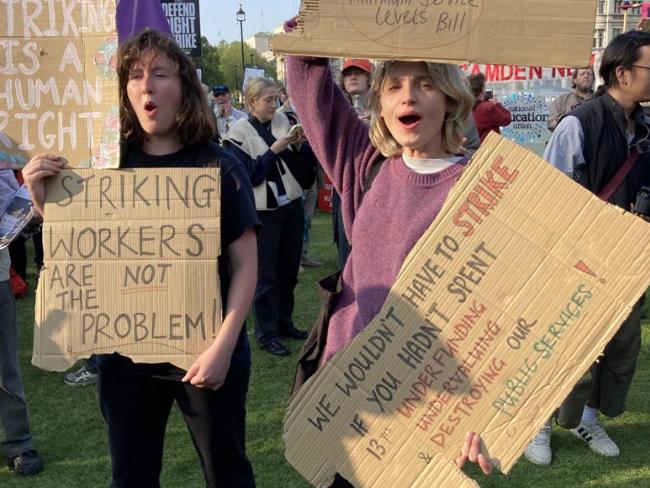
TUC emergency protest against the anti-strike legislation, London, 22 May 2023. Photo Workers.
The new Public Order Act, finally hurried through a pliant Parliament just days before the Coronation, is a giant step towards a far more repressive state. Peaceful protest is under threat. The Labour Party refuses to say it would repeal the Act if elected.
Groups such as Just Stop Oil and Animal Rising have worked to bring this about through “protests” aimed at working class events and activities: sports events, travel, art galleries, and at our places of work such as oil refineries and depots. These antics were a gift to the state.
On Saturday 6 May, the Metropolitan Police arrested and detained 62 people for several hours before releasing them. Wearing campaign T-shirts seemed to be sufficient to warrant arrest. Few of them were charged with any offences.
On the day, the Met also used facial recognition technology for the purpose of surveillance and arrest, another step towards a far more authoritarian state.
Compulsion
The Strikes (Minimum Service Levels) Bill is on its way through parliament. It would allow employers to name individual workers who they can compel to come to work on strike days, and for the government to set minimum service levels during strikes in public services.
Workers in public services, who have been fighting for jobs and pay to improve staffing levels and services, have condemned these minimum service levels as a stunt.
For example, doctors’ union the BMA said it had long called on the government to ensure safe staffing levels across the NHS. The government focus on minimum staffing levels to curtail strike action while claiming to protect the NHS, “…goes to the heart of why healthcare workers are striking and considering striking”.
Conspiracy
The Police, Crime, Sentencing and Courts Act 2022 introduced yet another new crime, conspiracy to cause a public nuisance, so widely defined as to make almost any protest an arrestable offence. This Act also gave the government even more powers, so it can in effect bypass parliament.
The Home Office has used the new Act to increase its powers over peaceful protest. In doing so it directly overruled parliament, an unprecedented move. The House of Lords had also rejected the government’s proposed amendments toughening the Public Order Act.
Instead of arguing its case in parliament, the government then reinstated its amendments by using its powers under the Police, Crime, Sentencing and Courts Act.
Protests by publicity seeking activists are a world away from collective working class action at the workplace. At ambulance workers’ picket lines at hospitals in the recent pay disputes, the police were either diplomatically absent, or chose not to enforce anti-trade union law. We are not satisfied with “protest”; we want to take charge.
